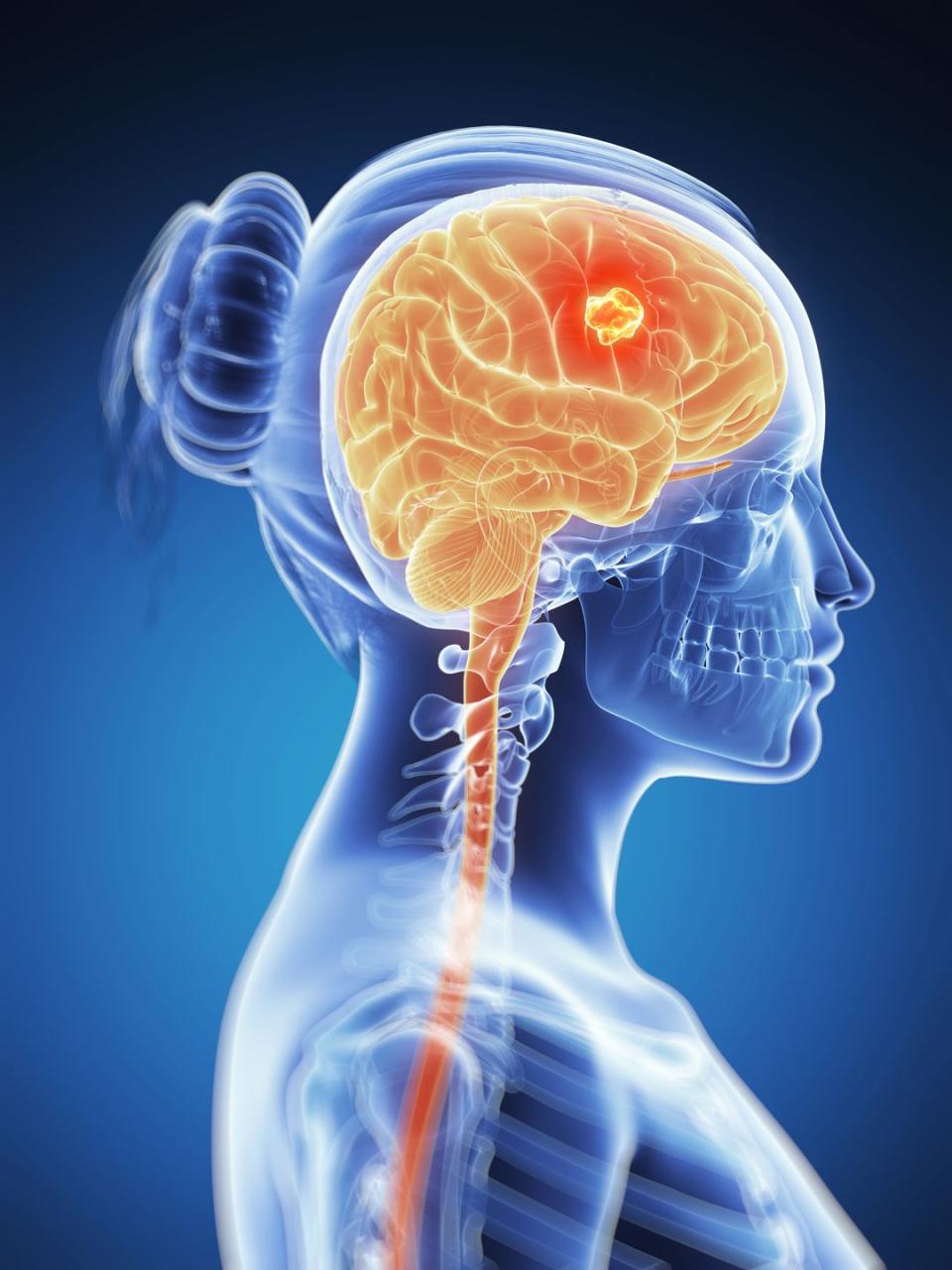This Nursing Student’s ‘Bad Hangover’ Was Actually an Aggressive Brain Tumor

Everyone has felt the pounding of an extremely bad headache after having a few drinks the night before-and such was the case with 23-year-old nursing student, Christina Smith, after she woke up with what she assumed was a hangover after her niece’s birthday party.
The Houston mom felt the pain of her headache all day, and when she went to bed that night, she experienced a seizure in her sleep. Her husband rushed her to the hospital, where Smith’s doctors discovered that her “headache” was actually an aggressive brain tumor wrapped around a large blood vessel in her brain, according to local news station Fox 26. Because the case was so complicated, surgery was a risky option.
“There was no way to remove that tumor without removing part of that vein, and when you take out a vein in the brain, as you can imagine, there are risks associated with that, like stroke, permanent brain damage, paralysis,” John Tynes, MD, chief medical officer at Bayshore Medical Center told local news station Fox 26. “So it was a very difficult, very brave decision … to go head and have the surgery.”
When Smith woke from her surgery, her brain tumor was gone but the right side of her body was paralyzed. Still, Smith says she was grateful it was her body and not her brain. After going through physical therapy, she ended up making a full recovery and is currently back in nursing school. “I had a little rehab in the hospital, and I was expected to have in-patient rehab, and the next thing you know, I start recovering faster than normal, so I didn’t need much rehab at all,” she says.
How often does a bad headache signal a brain tumor-and what other symptoms should you be aware of? Here, what you should know about your risk and how to spot the warning signs.
What is a brain tumor, exactly?

A brain tumor is a mass or growth of abnormal cells in your brain. There are many types of brain tumors, some of which are cancerous (malignant) and non-cancerous (benign). The good news is, the chances that a person will develop a malignant tumor of the brain or spinal cord is very rare. The American Cancer Society estimates the lifetime risk at less than 1 percent and men are slightly more likely to develop a brain tumor than women-about 1 in 143 compared to 1 in 185. However, certain types of tumors are more common in women.
Survival rates vary depending on the type of tumor as well as other factors, including the size, location, and rate of growth of the tumor. While some genetic disorders can lead to brain tumors, most arise in people with no known risk factors or predisposing factors, Theodore Schwartz, MD, a neurosurgeon with the Weill Cornell Brain and Spine Center, previously explained to Prevention.
And no, cell phones are not a known risk factor. “That’s a common misconception, but there’s no compelling evidence that pushes us to consider a link between cell phones and tumors,” Dr. Schwartz said.
What are the symptoms of a brain tumor?
Dr. Schwartz explains that brain tumor symptoms vary depending on its location in your brain. A headache actually isn’t a common early indicator of a brain tumor, unless the tumor is very large and aggressive, as it was in Smith’s case.
⚠️ Talk to your doctor if you’re experiencing the following symptoms, especially if you’re dealing with more than one.
Seizures
Having a seizure, such as Smith’s, is one of the first signs of a brain tumor. “Irritation from the tumor makes the [brain’s] neurons fire uncontrollably, and you get abnormal movements,” Dr. Schwartz explained. These could range from whole-body convulsions to jerking or flexing occurring in one limb or a specific part of your face.
Clumsiness
If you have been experiencing a string of unexplained clumsiness, it could be a sign of a brain tumor. Having trouble speaking, swallowing, maintaining balance, or controlling facial expressions should be a red flag.
Numbness
Another sign of a brain tumor can be losing feeling in a part of your body or face.
Changes in memory or thinking
In addition to big shifts in a person’s behavior in personality, small memory issues-such as having trouble remembering things or feeling confused-can also be a sign of a brain tumor.
Nausea
Feel sick or queasy, especially when it is out of the blue, could be a sign of a brain tumor. However, rule out these more common causes of nausea first, as it is a symptom for many other health conditions.
Vision changes
Blurry or double vision, as well as complete loss of vision, have all been associated with brain tumors.
How are brain tumors treated?
While large or malignant brain tumors are treated with surgery, medications, radiation, or chemotherapy, some non-serious varieties don’t involve any treatment at all. “Many tumors are small and benign, and require no treatment,” Dr. Schwartz explains. “If we find one, we’ll just monitor it for growth or changes.”
('You Might Also Like',)

